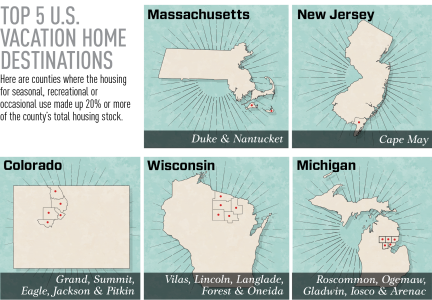The vacation home market is thriving. Here’s how CRS agents can take advantage of this niche opportunity
By Regina Ludes
Arlene Kelly, CRS, jumped into the Hawaii vacation home market 16 years ago with both feet planted firmly in the sand. After Kelly and her husband bought their own vacation rentals in Hawaii in 2002 and 2003, they decided to move from Philadelphia to Oahu the following year. Since both are REALTORS®, they studied the local real estate market and then launched Ola Properties in Kapolei, Hawaii.
Today, Kelly estimates that at least 90% of her business is working in the resort and vacation rental market. “The weather here is beautiful all year round, and buyers like the walkability of the area and being close to the beach,” she says.
According to the National Association of REALTORS®, an estimated 5.34 million existing homes were sold in 2019, of which 5% (or 267,000) were purchased as vacation homes. Further, increased financial wealth and low mortgage rates have boosted the demand for vacation homes, while low inventory in many markets has caused sales to stall.

To be successful in the hot vacation housing market, REALTORS® must first educate themselves about vacation properties because they are unlike traditional homes. In addition to studying local market statistics, pricing and inventory, agents should be familiar with state regulations, pertinent tax laws and licensing requirements. Private communities may have their own rules about rentals, common area usage and visitors. Most importantly, agents need to exercise patience because vacation buyers have specific housing preferences and take their time browsing listings and making decisions. Once agents master these skills, they can become the local vacation home market expert who clients trust with their investment.
Become a local expert
Before working with vacation properties, Michelle Cecchini, CRS, broker in Ormond Beach, Florida, north of Daytona, wanted to learn everything she could about this niche. So she signed up for every workshop she could find and earned an additional accreditation that gave her access to a network of vacation home professionals in other markets to keep up with the latest trends.
Becoming familiar with state and local real estate laws, especially as they pertain to vacation rentals, is important, she adds. “You don’t want to sell someone a home that they want to rent out but legally can’t,” Cecchini says. For example, in Ormond Beach, only six-month rentals are allowed, and vacation rentals are not allowed at all, while in the neighboring town of Ormond by the Sea, one-month rentals are permitted.
Meanwhile, in Hawaii, each resort community has its rules. For example, at the Ko Olina Resort on Oahu, Kelly says legal weekly rentals are permitted at one of the resort-zoned properties as well as monthly residential vacation rentals.
Most of Kelly’s clients are pre-retirement baby boomers, retirees, military families, investors and snowbirds who come to enjoy the sunshine, sand and surf. “Many families want to own a vacation home here that they can use and also rent out when they’re not using it,” Kelly says.
Understand the buyer’s needs
Vacation homebuyers are a different breed than those shopping for a primary residence. For one, they are notoriously slow in choosing a vacation property, so agents need to exercise patience. “Because they’re shopping for a vacation home, buyers can take their time to browse listings. There are no time constraints because of job changes or kids going to school,” says Geordie Romer, CRS, broker with Windermere Real Estate in Leavenworth, Washington, a Bavarian-themed mountain town located three hours from Seattle.
Vacation buyers he works with tend to be financially well-qualified to purchase a second home but are conservative in their approach. In many instances, a pre-qualifying letter is not as critical to the transaction as it is for primary homebuyers. “Many buyers in my market have money to spend for a second home but are unwilling to spend it. It’s common that they wind up spending an extra $100,000 they did not originally budget for,” Romer says.
Laura Durham, CRS, a broker with Mill Pond Realty in Saugatuck, Michigan, says vacation homebuyers are not alike and each one has different needs. One buyer with a demanding job in a large bustling city may look for a private getaway, while another seeks a large home for their family with outdoor space and easy access to downtown where there are restaurants and shopping. Agents need to take time to learn their buyers’ specific housing needs. As for home amenities, Durham says: “Buyers want to bring the outdoors in, so they want screened-in porches, hot tubs and open patios with a fire pit. They want amenities that make them feel they are truly on vacation.”
Durham says Saugatuck attracts many Floridians who flock to Michigan during the busy summer season to enjoy fishing and boating, and to escape the heat in their home state. In Leavenworth, Romer says many buyers want a place near the Cascade Mountains where they can enjoy outdoor recreation, like skiing and hiking. Most importantly, they don’t want what they already have.
“They don’t want a modern home or one with Tuscan architecture. They already have that. They want something that looks like a cabin or a lodge because they want to wake up in the morning and know they’re on vacation,” Romer says.
Consider whether to rent or manage
Keep in mind that most buyers aren’t local and live several hours away by car or plane. They won’t be doing any casual drive-bys. “You need to make it easy for buyers to find the listing online because that’s where they start their search,” Durham says. Photography is important, so be sure to include plenty of quality photos for your listings.
Another consideration is whether to get involved in managing and renting vacation properties when owners are not using them. Both Durham and Kelly have entire departments dedicated to property management, while Romer focuses solely on vacation home sales. Cecchini used to handle rentals, but stopped when she became burned out. “There were too many details to manage, from maintenance and taxes to billing, and I was handling everything myself,” says Cecchini, who now focuses on sales. Before undertaking the role of caretaker, agents should assess their professional capabilities and decide whether they have the manpower and systems in place to support those additional services.
Whether shopping for a cabin in the mountains, a lakeside cottage or a condo on the beach, vacation homebuyers welcome the expertise of agents who have the market knowledge and patience to guide them through the process.
“Increase Wealth with Rentals and Other Investment Properties” on CRS.com/learn can help you assist anyone looking for additional properties.








